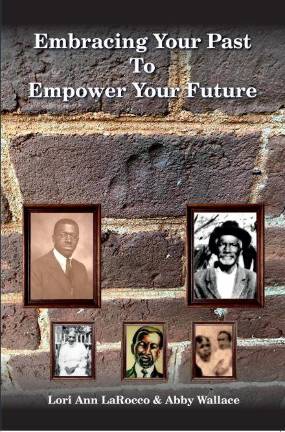Book highlights four families
WEST MILFORD. Mother and daughter tell about the descendants of slaves.


Lori Ann LaRocco and her daughter Abby Wallace have written a book focused on a taboo subject in U.S. history.
“Embracing Your Past to Empower Your Future,” released Feb. 6, investigates four families - the Allens, Madisons, Quanders and Brookses - who are descendants from slaves.
“We wrote the book after we toured the homes of Presidents George Washington, James Madison and Thomas Jefferson,” said LaRocco, a West Milford resident.
The book was inspired by a 2021 trip to those presidents’ homes.
“All three homes of the presidents are living museums. They’re open to the public. We took regular tours. We did have one private tour at Monticello, but the general public can see these fingerprints if they would like to,” she said.
The most surprising moments were when they saw fingerprints of slaves left in the bricks of Mount Vernon, Monticello and Montpelier, she explained.
“We were told that young children and women made the bricks and those are the fingerprints we were seeing. What struck us was the intention of the enslaved who make their mark on the world, literally.”
The fingerprints are visible on the cover of the book.
LaRocco and Wallace spent nearly three years writing it.
“We did a lot of historical research and we also worked with the families directly, the family historians. We also worked with the historians of Monticello as well as Mount Vernon to verify our findings,” LaRocco said.
“We also found never-seen-before historical documents for one of the families in Africatown because we also interviewed the descendants of the Clotilda.”
The Clotilda was the last slave shipment, illegally brought into the country in 1860, one year before the Civil War started.
The authors’ goal is to inspire people to reflect on this taboo aspect of U.S. history.
“Each chapter ends with the different pieces of advice that the descendants gave to me,” Wallace said. “I think that’s important not just for younger people, such as myself, but just for anyone to know because it teaches you to respect those that have come before you because we’re so transfixed on our lives and social media.”
LaRocco said, “These are people that are not in the history books and yet a lot of them should be. The Quander family is filled with a lot of civil rights activists. They were part of the March on Washington. They were part of the (fight for) women’s right to vote.”
The authors are not aiming to make money from the book, she said.
“We’re trying to get it out where all of the author royalties are going to the Each One Teach One book stipend. Each One Teach One is an African proverb that goes back to the days of slavery. If you were enslaved and you learned how to read, write or learn how to do arithmetic, it was your responsibility to pay it forward.”
In other words, slaves with those skills had a moral responsibility to teach others.
LaRocco works as the senior editor of guests and global supply chain reporter at CNBC.
Wallace is a senior at West Milford High School who is studying AP psychology and AP English. She also is a member of the National Honor Society, National English Honor Society and National Spanish Honor Society.
Both hope the book will help readers reflect on American history.
“I really want this to be a required reading text in schools,” Wallace said.
She believes in the importance of students learning history.
“This book especially can really help people realize that we need to look back so these things don’t happen again” she said. “We are all a product of our past and we have to look at our past to build our future.”
LaRocco added, “I hope that this book inspires others and that they possibly want to look at their own past to where they came from and to tell the stories of the voiceless.”
These are people that are not in the history books and yet a lot of them should be. The Quander family is filled with a lot of civil rights activists. They were part of the March on Washington. They were part of the (fight for) women’s right to vote.”
- Lori Ann LaRocco, author